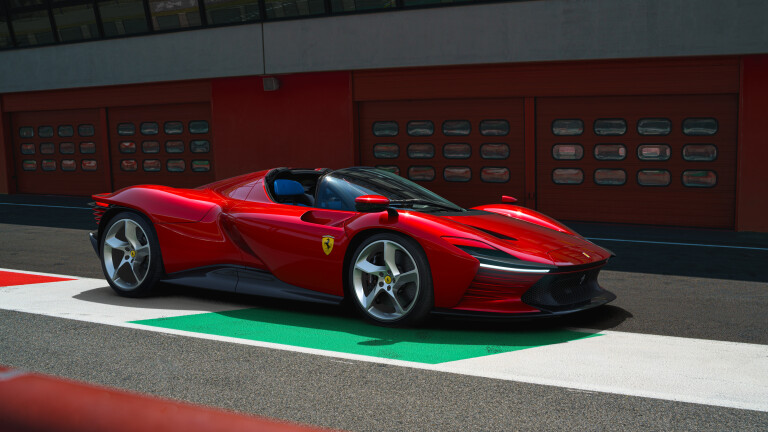
It has the chassis from the LaFerrari Aperta hypercar, and a naturally-aspirated 6.5-litre V12 that punches out 618kW at a screaming 9250rpm. And it’s the first Ferrari in history to be named Daytona.
Wait a minute…wasn’t the classic front-engine V12 coupé Ferrari built from 1968 to 1973 called the Daytona? The mid-engine Ferrari Daytona SP3, the third car in Ferrari’s limited-edition Icona series, is a completely different sort of car.
The truth is, the classic Ferrari we all recall as the Daytona is officially known as the GTB365/4.
The Daytona SP3 has been designed to evoke the spirit of Ferrari sports prototype racers from the ‘60s and ‘70s, and the name celebrates Ferrari’s one-two-three finish in the 1967 24 Hours of Daytona.
Only 599 will be built, and while Australian pricing has yet to be confirmed, it costs the equivalent of $3.2 million in Italy.
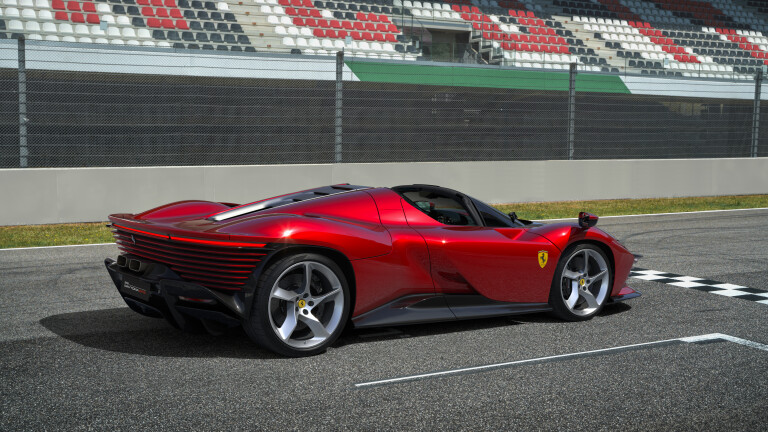
Ferrari’s Icona cars are designed to take themes and concepts from Ferraris of the past, and reinterpret them in a modern way, with newer materials and technologies. The Monza SP1 and Monza SP2 were designed to capture the spirit of 1950s Ferrari barchettas.
The Daytona SP3’s voluptuous haunches and bubble-screened cockpit echoes racing Ferraris like the 330 P3 and P4, the 512S, and the 350 Can-Am.
There are hints of the slab-sided 312PB and 512 M around the front wheels, and on the doors. The execution and detailing are pure 21st century, however.
The bodywork isn’t shaped just to look sexy. Sophisticated attention to detail includes; flicks on the front corners to increase downforce, sheer surfaces on the front guards and doors that help control airflow along the side of the car, and chimneys which bring air from underneath the car and direct it past the rear haunches and towards the subtle rear spoiler to help generate 230 kilograms of downforce at 200km/h without any active aerodynamic devices.
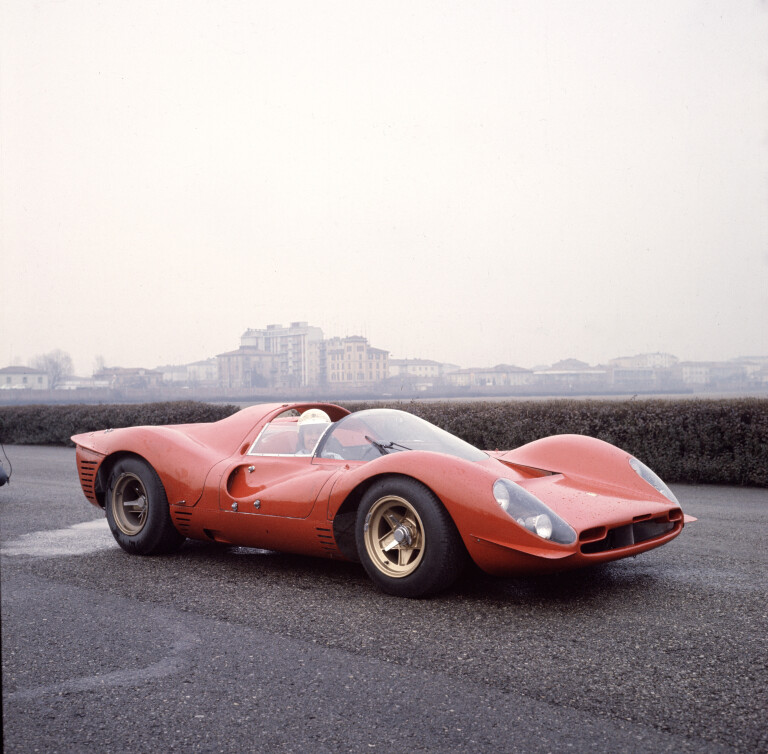
Clever design elements are everywhere. At the rear of the wasp-waisted Daytona SP3 a stack of body-coloured bars wrap around the back of the car to artfully disguise the venting required to deal with the thermal loads from the mighty 6.5-litre V12 mounted behind the cockpit. Retractable eyelids over the headlights give the front end a more menacing look.
“I have a special passion for this one,” says Ferrari design chief Flavio Manzoni.
“Every hypercar we launch should be the pinnacle of technology, a car that should be a reference point for our future development. But this [the Daytona SP3] is not a hypercar,” adds Ferrari marketing boss Enrico Galliera.
Galliera’s point is that the Daytona SP3’s design has not been optimised to ensure maximum performance – but to elicit maximum emotion. But that’s not to say it’s slow.
In addition to its 618kW at 9250rpm, the Daytona SP3’s V12, codenamed F140HC and the most powerful internal combustion engine ever built by Ferrari, pumps out a thumping 697Nm at 7250rpm.
It will rev to 9500rpm courtesy of new titanium conrods, which are 40 per cent lighter than equivalent steel items, new pistons, a lighter and rebalanced crankshaft, and sliding finger cam followers – a low-mass, low friction technology borrowed from Ferrari’s F1 engines.
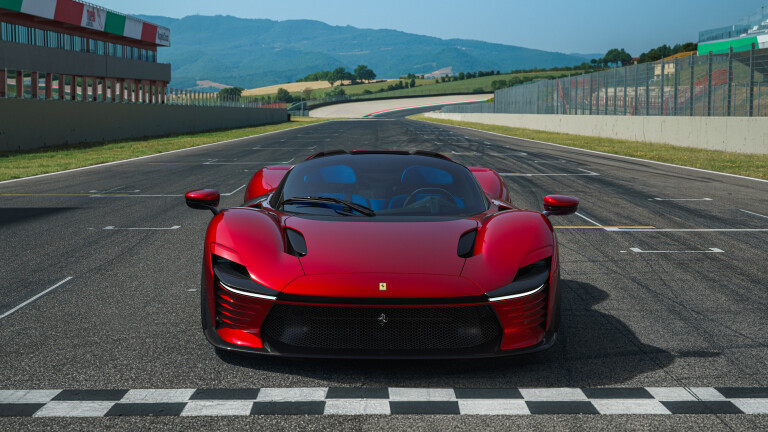
That’s a lot of investment to extract just 8kW and 5Nm more than the engine produces in the 812 Competizione.
But such has been the development of the 65-degree V12, which traces its origins back to the 485kW 6.0-litre engine that debuted in the Enzo almost 20 years ago, even marginal improvements in power and torque now take time and money. “It’s close to the limit,” acknowledges Ferrari’s chief technology officer, Michael Leiters.
The engine drives the rear wheels through a seven-speed dual-clutch transmission like that used in the LaFerrari. The Daytona SP3 weighs about the same as Ferrari’s hybrid hypercar and will sprint from 0 to 100km/h in 2.85 seconds and hit 200km/h in 7.4 seconds. Top speed is more than 340km/h.
Suspension layout and geometry is the same as that of the LaFerrari, as are the giant 398mm front and 380mm rear brakes.
And like the LaFerrari, the Daytona SP3 rolls on 20-inch front and 21-inch rear alloy wheels, though their five-spoke design has been optimised to help extract air from the wheel wells.
Tyres are Pirelli P Zero Corsas, 265/30 at the front and 345/30 at the rear, developed especially for the car and designed to maximise stability in low grip conditions.
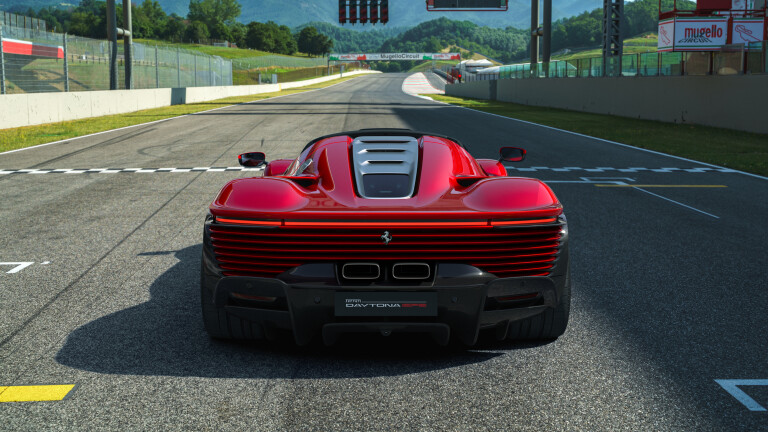
The Daytona SP3 comes with an upgraded version of Ferrari’s clever Side Slip Control system dubbed SSC6.1 and is the first mid-engine V-12 Ferrari to have the Ferrari Dynamic Enhancer (FDE) system that will allow drivers to drift the car if they want to – automatically keeping the maximum yaw angle under control by adjusting the brake pressure at each wheel.
The Daytona SP3 cockpit is a tight fit. The seats are fixed, their basic shape integrated into the composite central tub and covered with foam.
Making yourself comfortable behind the wheel means adjusting the reach and rake of the steering wheel and moving the adjustable pedal box. This has helped reduce weight and kept the car’s overall height to just 1142mm, which also helps reduce drag.
The driving position is lower and more reclined than in other Ferraris – similar, Ferrari says, to that of a single seater. The view through the windshield is spectacular, the bulge of the front guards amplified by the low bonnet, the front wheels seemingly so close you could almost reach out and touch them.
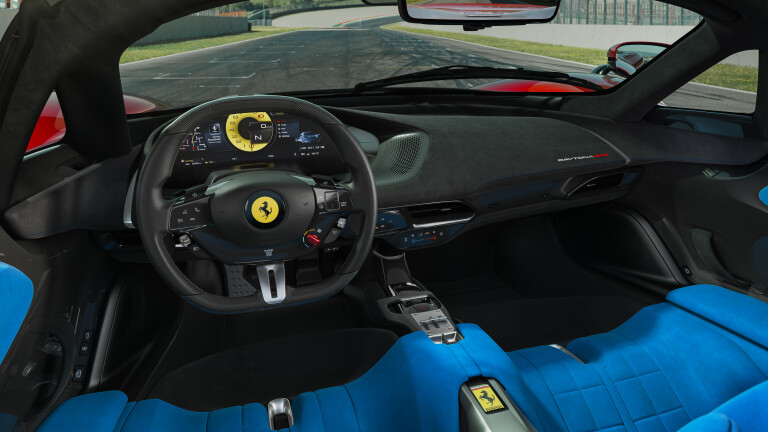
The Daytona SP3’s steering wheel features the same touch controls seen on the SF90 Stradale, Ferrari Roma, SF90 Spider and 296 GTB.
Drivers can actuate 80 per cent of the Daytona SP3’s functions without moving their hands. The instrument panel is a 16-inch curved HD screen.
Unlike the SP1 and SP2 Monzas, which cannot be registered in some countries because they don’t have a windscreen, the Daytona SP3 has been homologated for all markets worldwide. But even if you could afford a Daytona SP3, you can’t have one – Ferrari says all 599 have already been sold.
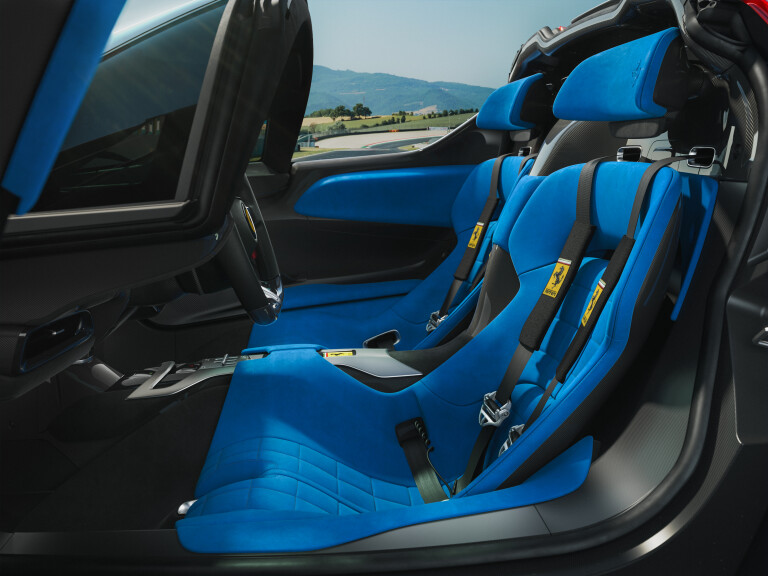



COMMENTS